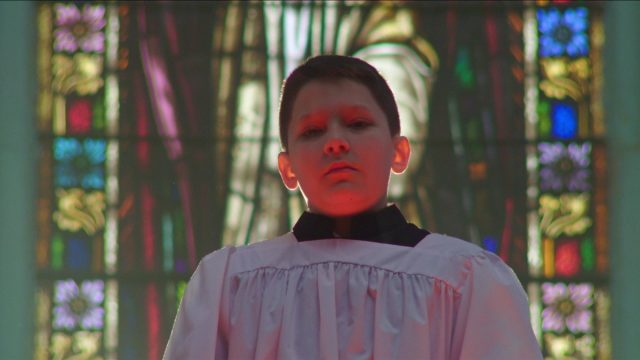AFI Fest 2021: Procession, by David Bax

According to a quick Wikipedia search (so take it with a grain of salt), Missouri comes in at 33rd on a list of states ranked according to the percentage of their population that identifies as Catholic. That’s surprising to me because, growing up there, it felt like pretty much everyone I knew or met for the first dozen or so years of my life was Catholic. But that’s the experience of being a kid raised in the midst of any particular church or religion. You only know so much of the world and what’s immediate to you becomes all of it. Keeping that in mind while watching Robert Greene’s Procession will help you to understand the helplessness of the boys–now middle-aged men–sexually abused by a number of Missouri priests.
Greene has arrived to document the work these men are planning to do with a Kansas City-based, registered drama therapist named Monica Phinney. Through working with her, the men will each write a short film as a means of processing some of their trauma and Greene will then stage and shoot it. What appears to be a documentary about childhood sexual abuse in the Catholic church soon reveals itself to be a documentary about drama therapy.
As a minor, negative aside about a movie I otherwise found both fascinating and moving, there’s no attention paid here to the question of whether or not therapy of any sort is hindered by being recorded by a third party or whether allowing such a thing to happen is ethical on the part of the therapist. In any case, at no point does Procession devolve into the superficial theatrics of the overpraised 2017 documentary The Work, which turned the idea of therapeutic breakthroughs into so much spectacle, like gawking at your coworker being “hypnotized” at a company retreat.
Okay, back to the task at hand. Drama therapy as a concept seems tailormade to be documented by Greene, who essentially does an armchair version of it in every movie, prodding people to act things out in order to get closer to their real feelings; Bisbee ’17 enlisted an entire town into his company of actors. This time, by turning the subjects into directors themselves, Greene surpasses the familiar arthouse filmmaker’s fascination with rehearsal and rises into the sphere of another preoccupation of great directors, the subject of filmmaking itself.
Amidst all this, Procession never forgets to be sensitive to the psychological turmoil of the men it features; on the contrary, the movie is often agonizing in a way that we hope but are not promised will be cathartic. But as a movie about making movies, it offers a thrillingly pro-art argument that directing a film is an act of self-expression more than one of technique. These guys may not be cinematic tradesman but, by funneling their emotions into creating something, they are artists.


























